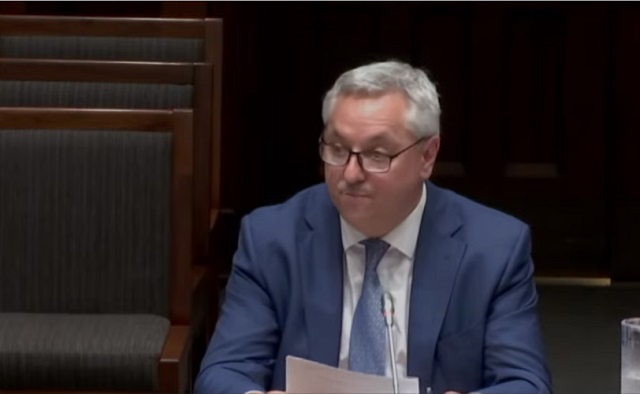Bruce Dowbiggin
Inherit The Wins: Hockey Has Its Privileges
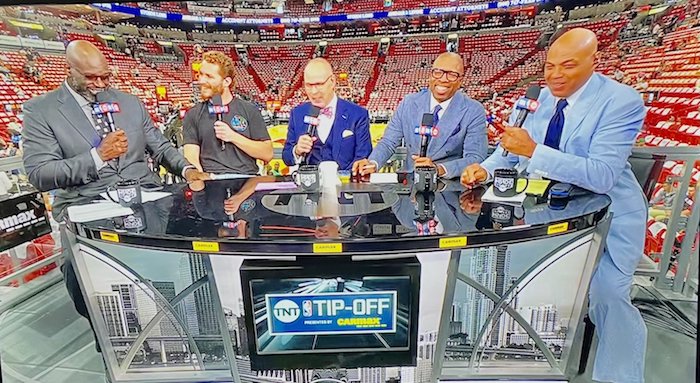
It might not have exactly been Neil Armstrong setting foot on the moon, but Florida Panthers glitter boy Matthew Tkachuk sitting in with the TNT NBA panel of Shaquille O’Neal, Charles Barkley and Kenny Smith might have been close that magnitude of collision between cultures.
Tkachuk has become the NHL poster boy in the U.S. by leading the sad-sack Panthers to the Final. In his casual Elbo Room T-shirt he was the epitome of the Fort Lauderdale hip cross-over star as he met the panel. While Barkley has become a hockey-fan-of-the-moment, Shaq professed total, wilful ignorance of the sport beyond its fighting. Smith was not much more puck savvy.
The highlight of the chat was Sir Charles suggesting he’d like to play hockey just once because he could only get a two-minute penalty for slugging Shaq. The two men did a little faux-theatre for the cameras to promote TNT’s coverage of the NHL Final.
The other nugget from the chat was the revelation that Tkachuk went to high school in St. Louis with Celtics star Jason Tatum, whose team was about to force Game 7 against the local Heat. Talk about a sports hothouse. Host Ernie Smith also showed pictures of Tkachuk with his legendary father Keith and his brother Brady of the Senators, marvelling at the genes involved in a 527-goal scorer siring two NHLers..
It’s both a wonder— and a concern— for the NHL, as we wrote in August of 2021. Because the brothers Tkachuk are part of a trend away from random selection and more to expensive grooming of elite athletes in the sport. Is equal outcome a lost cause?
“The NHL faces a question of opportunity at the moment. But this is not a racial or gender issue. The question facing a league renowned for its blue-collar roots is ‘has hockey become a rich person’s sport, a league where being an insider has extra clout?’
Are today’s superstars a product of more than talent? Are they also the products of an expensive, exclusive grooming process that leaves the Gordie Howe farm boy archetype in the dust?

One hint of the benefits of having access to resources and people within the hockey industry is the annual spate of sons of former NHLers now being drafted each summer. In the recent draft, there was a plethora of progeny selected, many at the very top of the draft. No other league has such a high percentage of sons being selected.
There have always been a few NHL father/ son duos. Gordie Howe’s boys and Bobby and Brett Hull spring to mind. But they were not as pervasive in the league as they are today. Witness the just-passed (2021) Draft that saw a host of familiar family names getting new surnames.
Cole Sillinger (Mike), Tyler Boucher (Brian), Josh Doan (Shane), Redmond Savage (Brian), Ryan St. Louis (Martin); Shane Lachance (Scott); Nick Malik, Marek), Justin Robidas, (Stephane), Jackson Blake (Jason) and Chase Stillman (Cory) were among the sons of famous fathers drafted. Others were signed as free agents.
It was no fluke. A glance around the NHL shows many sons of former stars getting steady work. Matthew and Brady Tkachuk (Keith), Kasperi Kapanen (Sami), Brandon Sutter (Brent), William and Alex Nylander (Michael), Sam Reinhart (Paul), Max Domi (Tie), Samuel Poulin (Patrick), Tag Bertuzzi (Todd), Ryan Johnson (Craig), Tyson Barrie (Len), Landon Ferraro (Ray), Marcus and Nick Foligno (Mike), Nolan Foote (Cal), Ryan MacInnis (Al) Brendan Lemieux (Claude), Ryan Donato (Ted), Daniel Audette (Donald) and Dominic Turgeon, (Pierre) are just a sampling of the direct relationship between father and sons..

The hockey pipeline is full of young men whose fathers could give them a hockey education but who also knew many of right people to tap into. The sophisticated training and arduous diet regimes are getting more like Tom Brady and less like Gump Worsley. And they’re expensive— even in Howe’s home nation of Canada which honours its roots.
This discipline and access is reflected in the United States where the boom in hockey participation is resulting not in farm boys and rink rats but in privileged sons and daughters of highly paid NHL stars getting an inside track on make the league or the Olympics.
NHL veterans in both the U.S., Europe and Canada know the inner workings of agents, independent training academies and skill trainers to help their sons past some of the highest hurdles in development. If they handled their millions properly they also have the funds to open doors for young stars.”
Author Malcolm Gladwell popularized the notion of taking 10,000 hours to translate talent into the finished product of a genius. It takes money to allow a young person that time, money that only a select number of families can provide. If you are a child in a single-income home or in a remote part of the country away from facilities, equipping and training a young prospect quickly gets out of the reach of parents of modest means.
Perhaps the most telling development story was that of Montreal goalie Carey Price, whose father bought a $13,000 four-seat Piper Cherokee plane to fly young Carey back and forth 320 kilometres to hockey practices all winter in northern B.C.
Where the NHL was predominantly players from blue-collar backgrounds till the Euros arrived in the 1970s, today it is often constituted of young men from families of means and education. Often, like Tkachuk, they’re in training academies with future stars in other sports. The idea of the farming

In that way, through no fault of Walter Gretzky, the super coach, hockey has become a sport for families of means or friends with means. He taught parents that the proper training and equipment was imperative. And that doesn’t mean simply the rink in your backyard. With a new pair of skates costs $500, a stick costs $125 or a set of goalie equipment runs into a few thousand dollars you are losing a segment of the population to financial costs. And so Walter’s legacy of training development is forever tied to a big price tag.
To say nothing of the progeny of NHL stars like Keith Tkachuk helping give their kids a hand-up in making it to the league and its vast piggy bank.
Sign up today for Not The Public Broadcaster newsletters. Hot takes/ cool slants on sports and current affairs. Have the latest columns delivered to your mail box. Tell your friends to join, too. Always provocative, always independent. https://share.hsforms.com/16edbhhC3TTKg6jAaRyP7rActsj5
Bruce Dowbiggin @dowbboy is the editor of Not The Public Broadcaster A two-time winner of the Gemini Award as Canada’s top television sports broadcaster, he’s a regular contributor to Sirius XM Canada Talks Ch. 167. Inexact Science: The Six Most Compelling Draft Years In NHL History, his new book with his son Evan, was voted the seventh-best professional hockey book of all time by bookauthority.org . His 2004 book Money Players was voted sixth best on the same list, and is available via http://brucedowbigginbooks.ca/book-personalaccount.aspx
Bruce Dowbiggin
Coyotes Ugly: The Sad Obsession Of Gary Bettman

It came to this. Playing in the 6,000 seat Mullet Arena on the campus of Arizona State. Owned by a luckless guy who eschewed the public spotlight. Out of the playoffs, their bags packed for who knows where, the Arizona (née Phoenix) Coyotes gave an appreciative wave to the tiny crowd gathered to say Thanks For The Memories.
With that they were history. Although NHL commissioner-for-life Gary Bettman has promised the last in a set of hapless owners that he can revive the franchise for a cool billion should he build the rink that no one was willing to build for the Yotes the past 20 years.
The Arizona Republic said good riddance. “Metro Phoenix lost the Coyotes because we are an oversaturated professional and college sports market with an endless supply of sunshine and recreational choices. Arizona may have dodged a slapshot:
We have the NFL Cardinals, the MLB Diamondbacks, the NBA Suns, MLB spring training, the WM Phoenix Open, the Phoenix Rising, the WNBA Mercury, the Indoor Football League Rattlers and the Arizona State Sun Devils. There hasn’t been a household name on the Coyotes since Shane Doan, and half of Phoenix probably doesn’t know who he was”.
Likely they’ll be a financial success in Salt Lake City where there’s a viable owner, lots of money and a will to make it work. They’ll need a will because— stop me if you’ve heard this before about the Coyotes— the rink they’ll play in this fall has only 12,500 unobstructed views for hockey.
Watching this farce we recalled getting a call from Blackberry co-founder Jim Balsillie in 2008, shortly after our book Money Players was a finalist for the Canadian Business Book of The Year. We’d written a fair bit about the Coyotes in our work and someone had told Balsillie we might be the ones to talk to about a plan he was concocting to buy the bankrupt Coyotes and eventually move them to Hamilton.

Balsillie was salty over the way he’d been used as a stalking horse in the financial troubles of the Pittsburgh Penguins in 1990s. Flush with money from the huge success of RIM, Balsillie offered to buy the Pens, with an eye to moving them to southern Ontario if Pittsburgh didn’t help build a new arena for the team.
In time, Balsillie saw that Bettman was only trying to protect the investment Mario Lemieux and others had in the Pens. Balsillie was the black hat who eventually spooked Pittsburgh into giving the current owners what they wanted. At the end of the day, Mario got his money and Balsillie was given a “thanks for trying”: parting gift of nebulous promises.
Still smarting, Balsille vowed not to be used again. in his desire to bring the NHL to southern Ontario. So when the Coyotes owner Jerry Moyes threw the keys to the team on Bettman’s desk, he saw an opening in the bankruptcy that followed. Seeing Bettman as the impediment, Balsillie decided to buy the team out of bankruptcy, a process the NHL could not legally prevent.
What Balsillie wanted to know was “What then? How would Bettman fight back?” We told him that no one flouts Bettman’s authority within the NHL. (All the current owners since 1993 have come aboard on his watch.) And that he’d have to get the Board of Governors to approve his purchase. Odds: Nil.
That’s what happened. Rather than admit that the Valley of the Sun was poisoned for hockey, Bettman found another series of undercapitalized marks to front the franchise while the league quietly propped up the operation. No longer was the Coyotes’ failure about the fans of Arizona. It was about Gary Bettman’s pride.

Protestors stand outside a press conference in Tempe featuring Arizona Coyotes executives discussing propositions related to a new arena and entertainment district. (Photo by Brooklyn Hall/ Cronkite News)
Where he had meekly let Atlanta move to Winnipeg he fought like hell to save Arizona. And his power. (His obstinacy on U.S. network TV is another story.)
Fast forward to last week and the abject failure of that process. The Arizona Republic naively fawned on Bettman for his many attempts to save the team. In fact, they were just attempts to buttress his grip on the league. While the Coyotes may have been a mess, Bettman has succeeded in preserving the investments of most of the business people who bought his NHL business prospectus.
Sometimes it meant riding into Calgary to chastise the locals for their parsimony in not giving the Flames a new rink. Ditto for Edmonton. Ditto for Winnipeg and other cities. Other times it was to shore up weak partners to protect the equity of other prosperous cities. Sometimes it was to tell Quebec City, “Not gonna’ happen.”
For his loyalty to the owners and through some luck— Gretzky to the Kings— Bettman has made the NHL work in places no one might’ve imagined. Nashville. Raleigh. Tampa. Las Vegas. Dallas. Not at the level of the NFL, NBA or MLB, but at a comfortable equity-affirming status. Nothing happens without his say-so in the NHL. Or without him getting credit. Secondary NHL execs who wanted credit for their innovations were quietly punted.
When Houston finally gets a franchise from Gary they’ll part with $1.5 billion for the honour. While the commissioner has played down new franchises and expanded playoffs, you can bet your last dollar that he’s told owners they’re in line for more expansion cash— cash they don’t have to split with players in collective bargaining.
One more certainty. As long as Bettman rules the NHL you won’t see an NHL team back in Arizona.
Bruce Dowbiggin @dowbboy is the editor of Not The Public Broadcaster A two-time winner of the Gemini Award as Canada’s top television sports broadcaster, he’s a regular contributor to Sirius XM Canada Talks Ch. 167. Inexact Science: The Six Most Compelling Draft Years In NHL History, his new book with his son Evan, was voted the seventh-best professional hockey book of all time by bookauthority.org . His 2004 book Money Players was voted sixth best on the same list, and is available via brucedowbigginbooks.ca.
Bruce Dowbiggin
Why Are Canadian Mayors So Far Left And Out Of Touch?

‘The City of Edmonton pays for a 22-person climate team but doesn’t know who on that team is responsible for what, or what that team has accomplished. Meanwhile, Council takes a pay raise and bumps our property taxes by 8.6%” @michaelistuart
We just returned from a long trip to discover that the City of Calgary wants to potentially re-zone our neighbourhood. Bridle Estates is a collection of 175 bungalow villas for people aged 55-plus. While some people still work most of the inhabitants are retirees. The city’s earnest idea is to create low-cost housing for the tens of thousands arriving here in the city from away.
You can see why a city hall obsessed with white privilege wants to democratize our neck of the south-west corner of the city. Enforced justice has a great tradition. 1970s American cities decided that bussing was the antidote to segregation. After a SCOTUS decision allowing the practice in 1971 (back when liberals owned the court) progressives pushed through an aggressive plan to bus kids from the inner city to the leafy suburbs. And vice versa.
It worked like a charm. For conservatives, that is. It radicalized a generation of voters who soon installed Ronald Reagan as president, and empty buses went back to the depot. The Democrats went from the party of the people to the party people in Hollywood. With time dulling memories, contemporary Woke folk are reviving the integration dream. This time the mostly white suburbs will bear the brunt of the government’s immigration fixation (400K-plus in the third quarter).

There are meetings planned where citizens will be able to address their elected officials— no doubt in a respectful voice. But anyone who’s dealt with Climate Crisis Barbie— Mayor Jyoti Gondek— has much optimism. This is a mayor who exploited a three-way split in centre-right voting here to declare a Climate Emergency on her first day in office.
Then she rolled out hate-speech laws to protect her from being razzed in public. For this and other fabulist blunders— her messing with the new arena project drove a worse deal and a two-year delay in a home for the Calgary Flames— she faced a recall project (which failed to collect over 400K voters’ signatures).
With a housing bubble expanding everyday, Her Tone Deafness has decided that owning a home is so passé. ”We are starting to see a segment of the population reject this idea of owning a home and they are moving towards rental, because it gives them more freedom.” She added that people have become “much more liberated around what housing looks like and what the tenure of housing looks like.”
As the Calgary’s schmozzles and Edmonton’s dabble in climate extravagance illustrate the municipal level of government in Canada is a few lobsters shy of a clambake. Across the country major cities are in the hands of radical NDP soldiers or virtue warriors who would rather have symbols than sewers to talk about.
In Toronto, Jack Layton’s widow Olivia Chow is leveraging her 37 percent mandate to make Toronto a kinder, Wok-er city. In Vancouver and Victoria, B.C., the open-air drug agendas of new mayors and city councils have sent capital fleeing elsewhere. Despite crime and construction chaos, Montreal mayor Valerie Plante won a second term, by emphasizing her gender.

In times when the coffers were full, this ESG theatre might have been a simple inconvenience. But since the federal and provincial governments began shoving responsibilities and costs downward to municipalities there is no wiggle room for grandstanding politicians at the city level. Or for hapless amateurs.
With the public incensed over residential property tax increases on one side and the blandishments of aggressive developers on the other, competent governance has never been more needed in the urban areas. While feds can (and have) printed money to escape their headaches and the provinces can offload costs onto the cities, the municipalities have no room for risk.
The time bomb in this equation is the debt load that the three levels can sustain. After this week’s budget, federal spending is up $238B, or 80 percent since 2015. Coming off this free-spending budget the feds have pushed the federal debt to more than $1.2 trillion this year (in 2015, the debt was $616 billion.) None of the provinces has shown any appetite for the 1990s-style cuts to reduce their indebtedness. Leaving cities to crank the property-tax handle again.
So far, Canada’s cities have been able to use friendly municipal bonds to ease their fiscal problems. But if the Canadian economy continues its tepid performance with no reduction in debt, financial experts tell us that there could be a flight from Canadian municipal bonds— with a consequent spike in interest rates elsewhere.
The backlash on free-spending governments will be severe— and restricted municipalities will be hardest hit. None of this is resonating with Canadians still flush with cash from Covid. The stock markets are still buoyant and those living in cashbox houses are counting their dividends. Willful denial is the Trudeau legacy.

Which is why so many Canadian were shocked last week when American AntiTrump media star Bill Maher did an intervention on Canadian conceits. Using the True North as his warning to America, Maher ripped apart the gauzy leftist dream of Canada as the perfect society, the Sweden north of Estevan. By the time he was done, the single-payer myth was bleeding on the ground.
Maher knows that the bill is coming due for free-spending Canada and its climate charlatans. (The IMF is already warning of a global crisis over debt loads.) The question is: will Canadians come to the same conclusion before it’s too late to save the cities?
Bruce Dowbiggin @dowbboy is the editor of Not The Public Broadcaster A two-time winner of the Gemini Award as Canada’s top television sports broadcaster, he’s a regular contributor to Sirius XM Canada Talks Ch. 167. His new book Deal With It: The Trades That Stunned The NHL And Changed hockey is now available on Amazon. Inexact Science: The Six Most Compelling Draft Years In NHL History, his previous book with his son Evan, was voted the seventh-best professional hockey book of all time by bookauthority.org . His 2004 book Money Players was voted sixth best on the same list, and is available via brucedowbigginbooks.ca.
-

 International2 days ago
International2 days agoUN attacks stay-at-home motherhood as ‘gender inequality’
-

 Censorship Industrial Complex1 day ago
Censorship Industrial Complex1 day agoDesperate Liberals move to stop MPs from calling Trudeau ‘corrupt’
-
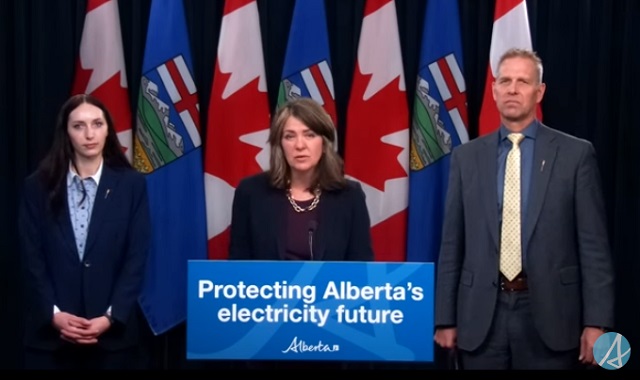
 Alberta2 days ago
Alberta2 days agoProvince to stop municipalities overcharging on utility bills
-

 Business19 hours ago
Business19 hours agoFederal government’s ‘fudget budget’ relies on fanciful assumptions of productivity growth
-
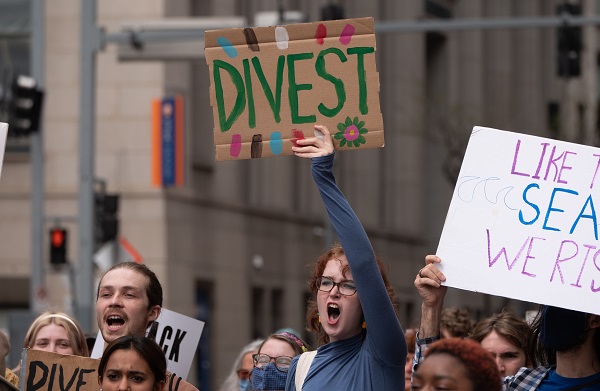
 Energy2 days ago
Energy2 days agoAnti-LNG activists have decided that they now actually care for LNG investors after years of calling to divest
-
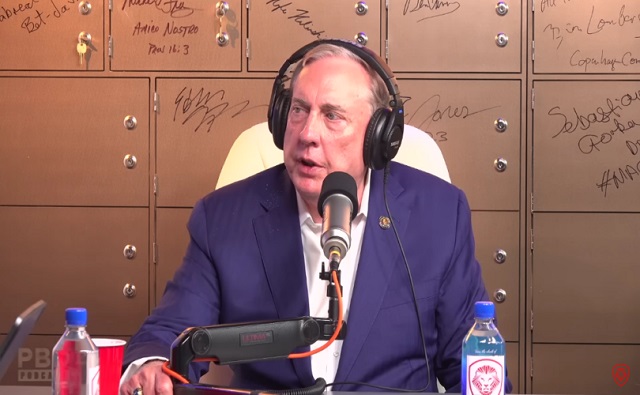
 conflict1 day ago
conflict1 day agoCol. Douglas Macgregor: US is ‘facing disaster’ as it funds overseas wars while bankrupt
-

 Alberta1 day ago
Alberta1 day agoAlberta government should create flat 8% personal and business income tax rate in Alberta
-
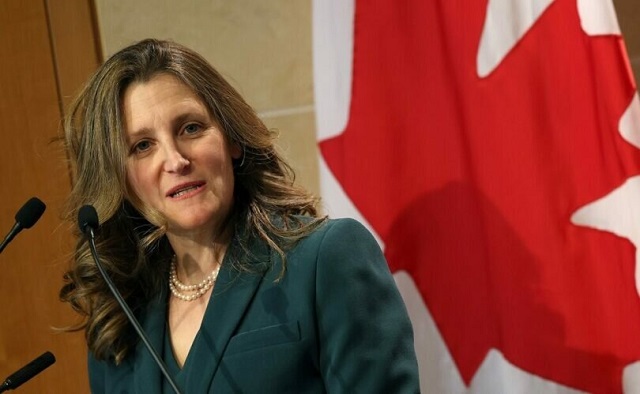
 Housing1 day ago
Housing1 day agoTrudeau’s 2024 budget could drive out investment as housing bubble continues







